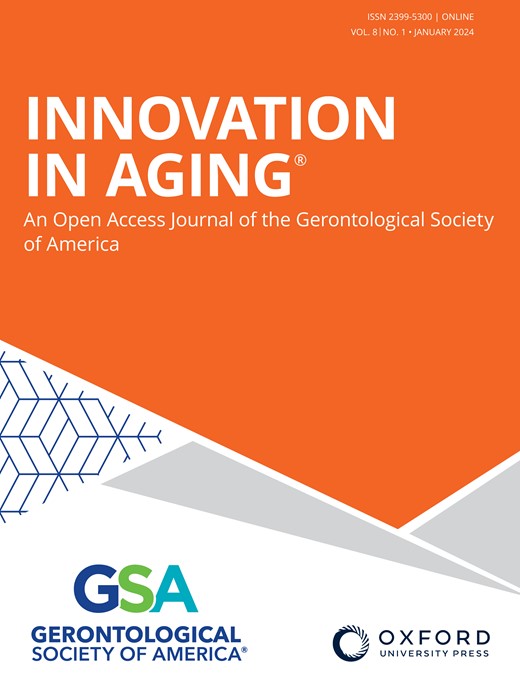从不相适应到适合:护理实践对复杂护理干预发展的影响
IF 4.9
3区 医学
Q1 GERIATRICS & GERONTOLOGY
引用次数: 0
摘要
摘要 护士在为老年人提供营养护理以预防和治疗营养不良、促进健康和幸福方面发挥着关键作用。然而,有关营养护理的护理活动往往缺乏证据。因此,有必要制定干预措施。从早期的研究来看,由护士进行循证营养干预似乎是最好的解决方案。本研究旨在概述为预防和治疗老年人营养不良而制定复杂护理干预措施的步骤,以及在此阶段所面临的挑战。在医学研究委员会(MRC)框架的干预措施开发阶段之后,进行了系统回顾、问卷调查、半结构式访谈、焦点小组和参与观察。目的是收集有关当前护理实践和背景、未来使用者和提供者需求的信息,并深入了解问题。研究表明,护士对(营养不良)的了解程度一般。在日常护理活动中,她们对营养护理的重视程度较低。这些结果说明,预期的护理营养干预措施很可能与实际情况不符。为了使干预措施与护理实践相适应,我们决定制定一项针对护士的教育干预措施,而不是由护士实施营养干预措施。根据具体情况进行论证是一项挑战,但对于防止复杂的护理干预措施与护理实践不匹配却是至关重要的。作为按照系统步骤严格制定干预措施的一个要素,它增加了成功实施的机会。本文章由计算机程序翻译,如有差异,请以英文原文为准。
FROM MISFIT TO FIT: THE IMPACT OF NURSING PRACTICE ON COMPLEX NURSING INTERVENTION DEVELOPMENT
Abstract Nurses have a key role in providing nutritional care to older adults to prevent and treat malnutrition, and stimulate health and well-being. However, evidence for nursing activities regarding nutritional care is often lacking. Therefore, intervention development is necessary. From earlier studies, an evidence-based nutritional intervention carried out by nurses appeared the best solution. The aim of this study was to outline the steps taken to develop a complex nursing intervention to prevent and treat malnutrition in older adults and the challenges faced during this stage. Following the phase of intervention development of the Medical Research Council (MRC) Framework, a systematic review, a questionnaire survey, semi-structured interviews, focus groups and participant observation were carried out. The purpose was to gather information about current nursing practice and context, the needs of future users and providers, and gain insight into the problem. The studies showed that nurses had moderate knowledge of (mal)nutrition. They gave nutritional care low prioritization during daily nursing activities. These results provided insight that the intended nursing nutritional intervention would most likely lead to a misfit with the context. To fit the intervention properly into nursing practice, it was decided to develop an educational intervention targeting nurses instead of a nutritional intervention carried out by nurses. Building proofs in context leads to challenges but is essential to prevent a misfit between complex nursing interventions and nursing practice. As an element of rigorous intervention development following systematic steps, it increases the chance of successful implementation.
求助全文
通过发布文献求助,成功后即可免费获取论文全文。
去求助
来源期刊

Innovation in Aging
GERIATRICS & GERONTOLOGY-
CiteScore
4.10
自引率
0.00%
发文量
72
审稿时长
15 weeks
期刊介绍:
Innovation in Aging, an interdisciplinary Open Access journal of the Gerontological Society of America (GSA), is dedicated to publishing innovative, conceptually robust, and methodologically rigorous research focused on aging and the life course. The journal aims to present studies with the potential to significantly enhance the health, functionality, and overall well-being of older adults by translating scientific insights into practical applications. Research published in the journal spans a variety of settings, including community, clinical, and laboratory contexts, with a clear emphasis on issues that are directly pertinent to aging and the dynamics of life over time. The content of the journal mirrors the diverse research interests of GSA members and encompasses a range of study types. These include the validation of new conceptual or theoretical models, assessments of factors impacting the health and well-being of older adults, evaluations of interventions and policies, the implementation of groundbreaking research methodologies, interdisciplinary research that adapts concepts and methods from other fields to aging studies, and the use of modeling and simulations to understand factors and processes influencing aging outcomes. The journal welcomes contributions from scholars across various disciplines, such as technology, engineering, architecture, economics, business, law, political science, public policy, education, public health, social and psychological sciences, biomedical and health sciences, and the humanities and arts, reflecting a holistic approach to advancing knowledge in gerontology.
 求助内容:
求助内容: 应助结果提醒方式:
应助结果提醒方式:


